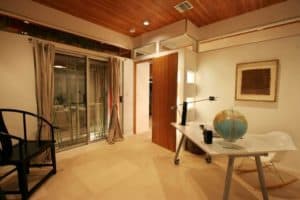It is not necessary to work at home to qualify for a home office, although those who do will undoubtedly need to establish one.
Setting up an office requires planning and decision-making. It may be a small office, but it’s your personalized office, so it must take time. A larger office will also take more time.
You can ask a professional to do the installation for you, but it will cost a lot of money because you will pay for the decor and the products they choose, and you will also pay for them.
It’s best to do the installation yourself because you can save more money, bring out your creative side and give your office a touch of your own.
Here are some tips for setting up a working space at home.
Choose the location of the office.

We recommend that you have a private office by turning a room or wardrobe into a desk. But if that’s not possible, choose a space in the room and ensure it’s as private as possible. Provide a room divider where necessary.
You can easily be distracted at home since you have easier access to the television, game console, pets, etc. Having a room divider will give you at least some privacy.
Set your budget and stick to it.
Now that you know your space, you’ll have an idea of the size of the desk, chair, or stand you need. Don’t go over your budget. Your home office needs to be set up, not established at a given time.
If you set up everything at once, you may not like what you see or use, or you may not even need it at first as the days go by. You then must go through a series of returns or buy-backs, which will cost you more money.
Choose your light source.
We recommend that you sit next to a natural light source. And in 90% of cases, it’s the window. According to studies, natural light is the most effective for making computer users efficient and productive.
If natural light is almost impossible to achieve, opt for a Seasonal Affective Disorder (SAD) lamp as it is the closest you can get to the sunlight.
Find yourself a good office.
Whether it’s a simple desk with no fuss or a computer desk with all the compartments, it should be something you feel comfortable working in. But it should be the right height and size for optimum efficiency and working comfort.
A desk that is too high will hurt your neck. If it’s too low, it will give you hunches. It should have enough legroom to move around and not stay stiff all day.
Some desks can be turned into standing desks, allowing you to choose to stand or sit when working on the computer.
If your space is limited, measure it and the desk to ensure it fits perfectly. Simple, conventional desks are the solution if you need more legroom.
Find a good chair.
This and your desk can make or break your home office game.
If an office desk is more about having the right eye and hand level to prevent neck and wrist strain, including legs, an office chair is more about having the proper posture and spine alignment to treat back pain and stiffness and promote spinal health.
And like the office, it must have the right height and comfort. If it does, you’ll have a ton of back pain, including eye strain, to suffer for a long time unless you change chairs.
Office chairs have evolved over the last decade or so. You have your conventional office chair and alternatives such as a kneeling chair, an exercise ball chair, and a saddle chair, to name just a few. These chairs are designed to give you the right posture for work.
Make sure the room is conducive to effective work.
First of all, the air quality should be good or even excellent. Fresh air is always best, but it’s not always applicable. But all is not lost.
There are two things you can do to improve air quality. First, keep your space clean by vacuuming and cleaning regularly. Second, use houseplants, because they are the first to provide fresh air.
De-cluttering.
Seriously, don’t put things in place or put things in place that you don’t need. It can also be easy to eat or drink while working at home. But a bright, clutter-free home means productivity.
We’re not saying you should throw away extra things you have. We’re telling you to need to organize them properly. If not, hide them. It also helps if you have a bin next to you, especially if you tend to have rubbish while you work.
Have an alternative energy source.
If you work at home and your home doesn’t have a generator, it’s better to get a mobile phone. You know, one that runs on gas, propane, or solar power. You never know when you’ll need it, so it’s always best to have it handy.
Laptops can also be used while camping or hiking, which is a win-win situation if you’re a fan.
Conclusion
We know how much comfort is synonymous with work these days. And it should be. Working on the sofa, the bed, or even the floor is fine, but only for a short time.
Doing it regularly and for hours risks many health problems such as spinal displacement, scoliosis, carpal tunnel, and others. And these problems should not be taken lightly.
Setting up a home office is relatively easy if you know what you need and like. A personal home office makes work more productive because you’ll have your workspace that you know is only for work.